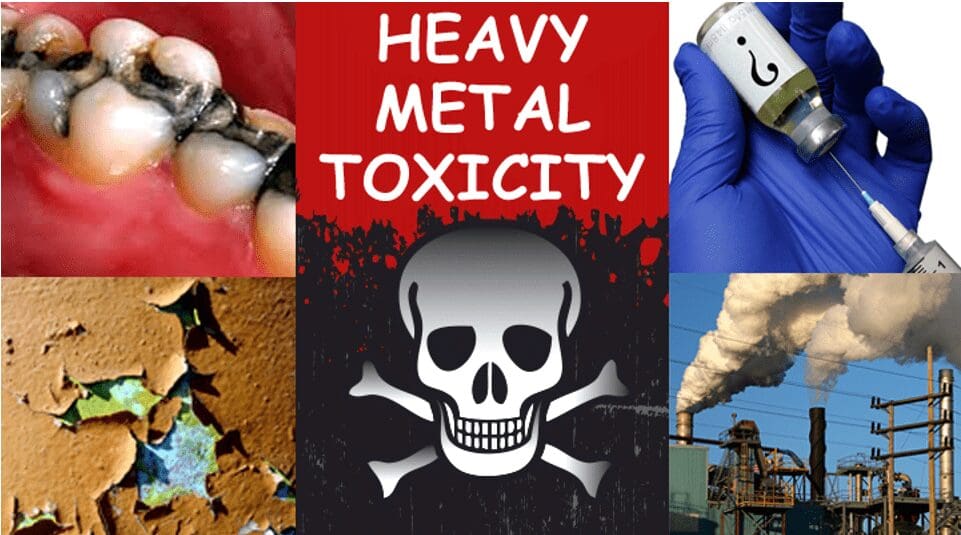Heavy Metal Analysis/Treatment/Detoxification
Heavy Metal Analysis/Treatment/Detoxification

Heavy metal poisoning is the accumulation of heavy metals, in toxic amounts, in the soft tissues of the body and negatively affect tissues and organs. Inside cells, heavy metals generate free radicals, causing oxidative damage that can harm or even kill the cells, which causes side effects and health problems.
Symptoms and physical findings associated with heavy metal poisoning vary according to the metal accumulated. Many of the heavy metals, such as zinc, copper, chromium, iron and manganese, are essential to body function in very small amounts. But, if these metals accumulate in the body in concentrations sufficient to cause poisoning, then serious damage may occur. The heavy metals most commonly associated with poisoning of humans are lead, mercury, arsenic and cadmium. Heavy metals, elements like mercury and lead that are denser than water, are present in many everyday items, particularly if you live in a home built before the 1980s. Acute or chronic exposure can lead to heavy metal poisoning, a serious medical problem.
Heavy metal poisoning may occur as a result of industrial exposure, air or water pollution, foods, medicines, improperly coated food containers, or the ingestion of lead-based paints.
Signs and Symptoms of Heavy Metal Poisoning
Symptoms of heavy metal poisoning depend on the type of metal causing toxicity, and the duration of symptoms due to heavy metal poisoning vary depending on which type of metal you were exposed to. With arsenic and lead exposure, for example, symptoms may not show up for two to eight weeks, with cadmium poisoning, however, symptoms may arise hours after you’re exposed.
SYMPTOMS OF HEAVY METAL POISONING
The symptoms of heavy metal poisoning can range from mild to severe, depending on how much metal the patient is exposed to and the length of time of the exposure. Common symptoms include:
- Abdominal pain
- Abnormal heartbeat
- Anemia
- Brain damage
- Changes in mood
- Constipation
- Diarrhea
- Difficulty walking (mercury poisoning)
- Fever (cadmium)
- High blood pressure (lead)
- Impaired kidney function
- Impaired liver function
- Kidney damage and/or renal failure
- Lack of coordination (mercury)
- Learning difficulties in children (lead)
- Memory loss (lead)
- Metallic taste in the mouth (arsenic)
- Muscle pain
- Muscle weakness (mercury)
- Nausea
- Nerve damage (mercury)
- Neurological problems
- Numbness
- Shortness of breath
- Speech and hearing problems (mercury)
- Swollen or red skin (arsenic)
- Thyroid dysfunction
- Tingling in hands and feet
- Vision changes (mercury)
- Vomiting
Long-term or chronic exposure to lower levels of heavy metals may cause symptoms that develop slowly over time. Symptoms may include:
- Headache
- Weakness
- Tiredness
- Muscle pain
- Joint pain
- Constipation
Causes and Risk Factors of Heavy Metal Poisoning
Heavy metal poisoning can be caused by:
- Industrial exposure
- Air or water pollution
- Foods
- Medicines
- Improperly coated food containers, plates, and cookware
- Ingestion of blood based paints
- Ingestion of insecticides
- Herbicides
- Pesticides
- Metal amalgam fillings are one of the top ways most Americans are exposed to heavy metals. Biological dentists understand the urgency of safely removing these fillings using specialized protocols to keep the patient safe from the heavy metal toxicity of amalgam fillings.
Complications of Heavy Metal Poisoning
Lead, mercury, arsenic, and cadmium are the metals most commonly associated with heavy metal poisoning in the United States. Here are some complications that may arise from each:
- Lead Poisoning Overexposure can lead to high blood pressure and damage to your reproductive organs.
- Mercury Poisoning It’s possible to experience lung damage, brain damage, vision problems, skin changes, and gastrointestinal problems.
- Arsenic Poisoning Overexposure can cause neurological problems, gastrointestinal issues, cancer, and low blood pressure.
- Cadmium Poisoning You may experience decreased lung and kidney function.
Related Conditions and Causes of Heavy Metal Poisoning
The following disorders may be associated with heavy metal poisoning:
- Metal Fume Fever This condition is caused by exposure to the fume of certain metals — for example, when galvanized steel is welded in an area that isn’t properly ventilated.
- Fanconi’s Anemia This blood disorder can be acquired through acute lead poisoning.
- Wilson’s Disease With this inherited disorder, excess copper builds up in the body and accumulates in your organs.
*To schedule an appointment, please call or email:
telephone: 631-283-0015
email:office@drmagdalenas.com
In office, Telehealth, Virtual visit available
Office locations in Southampton and Manhattan








